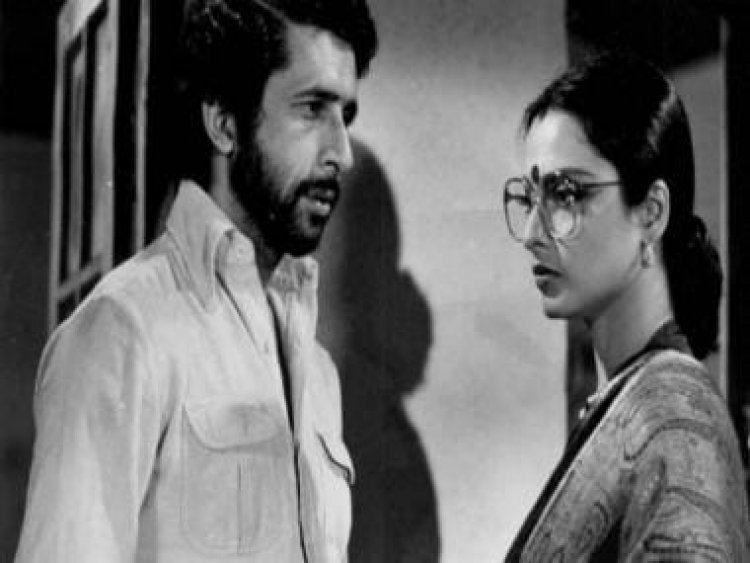35 Years of Ijaazat: Gulzar paints a poetic portrait of love and loss
35 Years of Ijaazat: Gulzar paints a poetic portrait of love and loss

What happens when two people, madly in love one day, go their separate ways the next? When they meet years later, is there a strange familiarity that grips their wrenching hearts? What does love leave behind when it escapes from that narrow crevice of two people’s souls? Gulzar answers all these questions, in perhaps what can be known as his poetic masterpiece, Ijaazat. As the lyrical movie starring Rekha, Naseeruddin Shah, and Anuradha Patel in leading roles, completes 35 years today, it would be no less than a sin, to not go back to it, and remember why, this moving montage of love, separation, heartbreak, and relationships is one of Hindi cinema’s finest.
Based On Subodh Ghosh’s story, Jatugriha, Gulzar’s Ijaazat lays open the syntax of relationships and love, as it accounts regret, loss, and closure, in the most poetic way possible. Maya, played by Anuradha Patel has grown up in a broken home, and doesn’t wish to get married, therefore she lives with her lover, Mahen (Naseeruddin Shah). However, when one day Maya disappears and isn’t to be found, Mahen marries Sudha (Rekha), succumbing to his reality.
The two build a life of their own, little by little (katra katra), but has past ever really stayed in the past? In Sudha and Mahen’s ornatley built home, lingers he presence of this past – Maya. Even while, Sudha accepts Mahen’s rationed love towards her, Maya’s conspicuous presence haunts them both. In Mahen’s laid open wounds, Sudha sees the woman who captivates her husband’s dreams, and in Sudha’s discomfort and inhibition, Mahen sees his past that haunts his wife’s days. Maya, this third person in Sudha’s and Mahen’s marriage is weighing their present down with her past, and seems to be dictating the marriage, with her chronic presence.
With her around, Mahen’s wounds aren’t healing, and Sudha who tries to be the salve, isn’t enough. While Maya writes Mahen passionate, and yearning poems reminding him of their love, Sudha silently keeps his house together. Mahen loves Sudha, but not how he loves Maya, and in that travesty, Gulzar paints of portrait of love, that comes in every hue, not just red. However, there comes a day, when love isn’t enough, or rather love has spilt over, and it’s eroding away everything that comes in its course, until the road is abandoned and empty.
However, the story begins at the end in Ijazaat, and Gulzar lyrically portrays how if love is defiant, then life is also insurgent, as five years later, on a rainy and thunderous night, it throws Mahen and Sudha back in each other’s path, because no matter how broken, the shards of hearts and relationships must be stitched back together, if not for a reunion, then simply for a closure. Gulzar does this with Sudha and Mahen, when they meet again in a dimply-lit railway waiting room, and there Ijazaat begins.
Mera kuchh samaan, tumhare paas pada hain, o sawan ke kuchh bheege bheege din rakhe hain…// aur mere ik khat main lipti raat padi hain, woh raat bhuja do, mera woh samaan lauta do.
Do relationships just disintegrate, when they end, or do their broken pieces become a part of us? Ijazaat remains poignantly relevant, even after 35 long years, because of how it poses the right questions. It explores the unchartered space, of all that takes place in love – not the kind they show you in movies, but the kind that is sometimes not enough, sometimes too overwhelming, sometimes too real. It accounts heartbreak and regret, again not the way you read in fiction and poetry – not the kind that you address with a half-filled bottle of whiskey, or belgian chocolate ice-cream, but the kind that pesters you, the kind you ignore until it shifts the ground beneath your feet, the kind that demands to be felt.
Ijazaat, teaches you about life – the uncertain, the incomprehensible, the one that doesn’t have a clear lines defining right and wrong. Ijazaat is a film that matters today, because it allows you to feel, without articulating it. 35 years later, Ijazaat only proves that life, love, and loss, are all perennial, and in the end, it’s all about embracing them all.
Takshi Mehta is a freelance journalist and writer. She firmly believes that we are what we stand up for, and thus you'll always find her wielding a pen.
Read all the Latest News, Trending News, Cricket News, Bollywood News, India News and Entertainment News here. Follow us on Facebook, Twitter and Instagram
What's Your Reaction?

























































